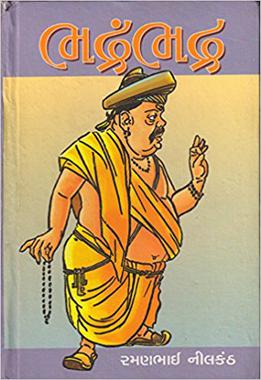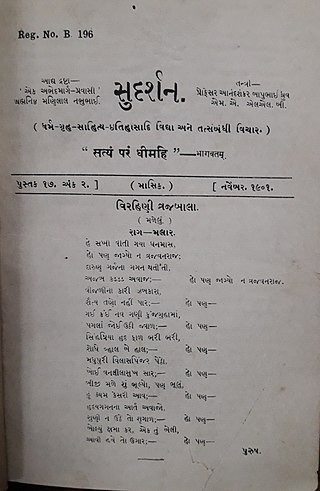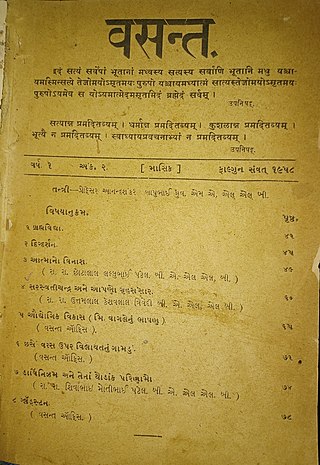Related Research Articles
The history of Gujarati literature may be traced to 1000 AD, and this literature has flourished since then to the present. It is unique in having almost no patronage from a ruling dynasty, other than its composers.

Manilal Nabhubhai Dwivedi was a Gujarati-language writer, philosopher, and social thinker from British India, commonly referred to as Manilal in literary circles. He was an influential figure in 19th-century Gujarati literature, and was one of several Gujarati writers and educators involved in the debate over social reforms, focusing on issues such as the status of women, child marriage, and the question of whether widows could remarry. He held Eastern civilisation in high esteem, and resisted the influence of Western civilisation, a position which drew him into conflicts with other social reformers of a less conservative outlook. He considered himself a "reformer along religious lines".
Manilal Bhagwanji Desai (1939-1966) was a Gujarati poet from India.

Dhirubhai Premshankar Thaker was an Indian Gujarati writer, who was best known for creating the Gujarati Vishwakosh, a 25-volume encyclopedia of the Gujarati language.

Bhadrambhadra is a 1900 Gujarati satirical novel by Ramanbhai Neelkanth. It is regarded as the first humorous novel in Gujarati literature and as the first Gujarati novel written in the first person narrative. Ramanbhai used the novel to illustrate the ridiculousness of a highly orthodox view of Gujarati society and as a vehicle for social reform.

Atmavrittanta, formally published as Manilal Nabhubhai Dwivedinu Atmavrittanta, is an autobiography written by Gujarati writer Manilal Nabhubhai Dwivedi (1858–1898). Its publication was prevented for many years by Manilal's family and friends because it contains explicit details of his extramarital relations and controversial views on morality.
Pransukh Manilal Nayak was an Indian Gujarati theatre actor, director, manager, and playwright from Gujarat, India. Born into a family of traditional theatre actors, he joined theatre troupes at a young age and rose to fame for his comic roles and female impersonations. His performances as a woman from Banaras in Kumali Kali and as Jivram Bhatt in Mithyabhiman were acclaimed. During his long career, he worked with many theatre companies and gave 22,455 performances, earning a listing in the 1989 Guinness Book of Records.

Kanta is an 1882 Gujarati play by Manilal Dwivedi, based on a historical event; the killing of King Jayshikhari of Patan by King Bhuvad of Panchasar. Dwivedi added the characters of Tarala, Haradas and Ratnadas from his own imagination and gave dramatic twists to the original story in order to make the story more suitable for a dramatic retelling. It has been called the most outstanding play of the 19th century in Gujarati literature. Reportedly, the play has elements of Sanskrit drama and Shakespearean tragedy reflected in its construction, due to Dwivedi's recent translation of Sanskrit play Malatimadhavam and studies of Shakespeare's plays. Kanta had moderate success on the stage. The Mumbai Gujarati Natak Mandali inaugurated its theatrical activities by staging this play on 29 June 1889.

Siddhantasara is a 1889 Gujarati book on the history of philosophy by Indian writer and philosopher Manilal Dwivedi. It is a historical critique of the world's religious philosophies. The book deals with the evolution of religious sentiment and attempts to establish the superiority of the Advaita philosophy over other religious philosophies.

Gulabsinh is an 1897 Gujarati supernatural novel by Manilal Dwivedi (1858–1898), adapted from English writer Edward Bulwer-Lytton's novel Zanoni. It was serialised in Priyamvada from the magazine's first issue in August 1885 to June 1895. Adapted into two plays, the novel – despite its flaws – is considered to have a significant place in Gujarati literature.

Nari Pratishtha is an 1882 essay, published in 1884, by Manilal Dwivedi written in Gujarati which discusses the status of women in Hindu tradition. This essay is considered to be Manilal's most important work. With its publication, Manilal became one of the major Indian social thinkers of his time. It remains central to Manilal's ideas on social reform. All his other writings on the women's questions and the social reform movement use this text as a referent
Gujarati was a Gujarati language weekly published from 1880 to 1929 by Ichcharam Desai and his sons.

Mansukhram Suryaram Tripathi was a Gujarati essayist, biographer, and thinker from British India. He led a conservative school of Gujarati writers who advocated avoiding the use of foreign words in writing and speaking, and promoted the use of Sanskrit or Sanskritised words. He was a cousin of the Gujarati writer Govardhanram Tripathi.
Nrusinhavatar is one of the two Gujarati plays written by Manilal Nabhubhai Dwivedi, the other is Kanta. Written probably in 1896, it recounts the puranic mythological tale of Nrusinhavatar. It was first staged by the Mumbai Gujarati Natak Company in 1899 but was unsuccessful. It was staged again in 1906-07 and became successful. It was edited and published as the book by Dhirubhai Thaker in 1955.

Priyamvada was a Gujarati magazine founded and edited by Manilal Nabhubhai Dwivedi. It was established with the aim of educating women, and ran from August 1885 to 1890; it was then converted into another literary magazine, Sudarshan. It was written with an informal tone, which was popular with its readership.
Gujarati Natak Mandali (1878–89) and its successor Mumbai Gujarati Natak Mandali (1889–1948) was a theatre company in Bombay, British India. It made immense contribution to the Gujarati theatre, with productions of more than hundred plays, as well as the training and introducing of many major actors and directors.

Sudarshan Gadyawali is a 1909 collection of prose writings by Gujarati writer Manilal Dwivedi (1858–1898), which appeared in his journals Priyamvada and Sudarshan from 1885 to 1898. It contains essays on a broad range of subjects, including religion, ethics, social reform, education, politics, nationalism, theosophy, women's welfare, Eastern and Western philosophy, music, and literature, in addition to a number of book reviews.

Sudarshan was a Gujarati magazine founded and edited by Indian writer Manilal Nabhubhai Dwivedi.

Amar Asha is a Gujarati poem by Manilal Dwivedi. It was his last poetic work – published posthumously in the 1898 issue of his own magazine, Sudarshan. Described as Manilal's most important work and cited as one of the most popular poems in Gujarati literature, Amar Asha has been studied and interpreted by several writers since its publication.

Vasant was a Gujarati-language magazine founded and edited by Anandshankar Dhruv, which ran from 1902 to 1939. The magazine played a key role in the development of Gujarati prose writing, and is considered to hold a significant place in the tradition of Gujarati literary magazines.
References
- 1 2 3 4 Mehta, Hasit, ed. (2012). Sāhityika Sāmayiko : Paramparā ane Prabhāvaસાહિત્યિક સામયિકો : પરંપરા અને પ્રભાવ[Literary Magazines : Tradition and Influence] (in Gujarati) (1st ed.). Ahmedabad: Rannade Prakashan. pp. 65–68. ISBN 978-93-82456-01-8. OCLC 824686453.
- 1 2 3 4 Thaker, Dhirubhai (1996). "જ્ઞાનસુધા". In Thakar, Dhirubhai (ed.). Gujarati Vishwakosh (in Gujarati). Vol. VII (1st ed.). Ahmedabad: Gujarat Vishwakosh Trust. p. 858. OCLC 164765976.
- ↑ Thaker, Dhirubhai (1987). Jñānasudhā: Svādhyāya ane Sūciજ્ઞાનસુધા: સ્વાધ્યાય અને સૂચિ[Bibliography of Material Published in Jnanasudha] (in Gujarati). Gandhinagar: Gujarat Sahitya Academy. OCLC 22112416.